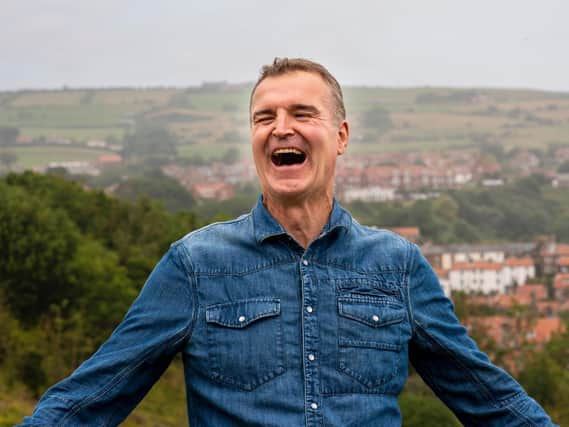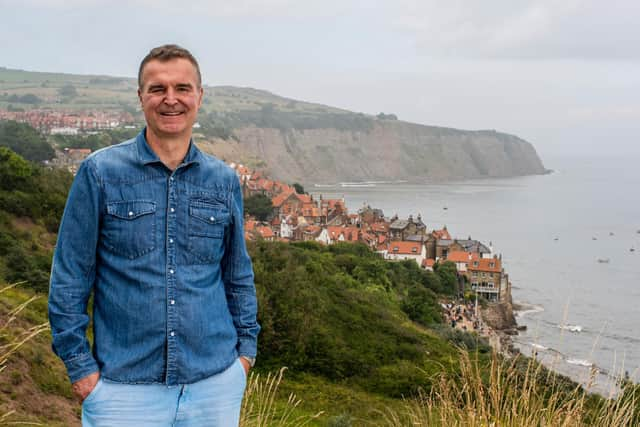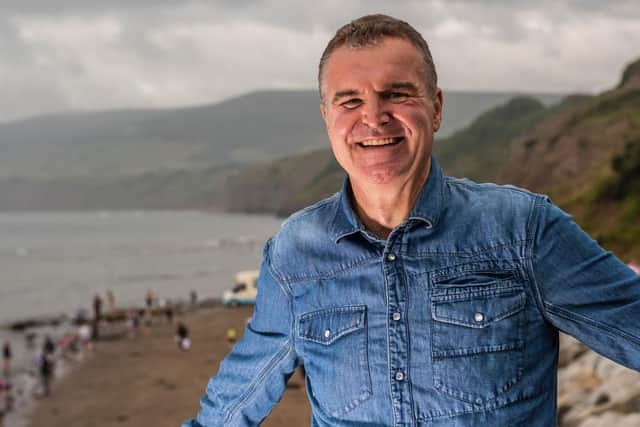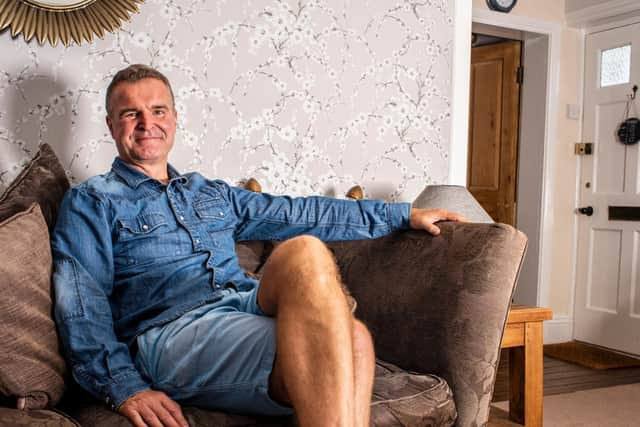Dave Clark on missing the darts, dealing with Parkinson's and following Bruce Springsteen around the world


When Dave Clark signed off Sky’s darts coverage of the Unibet Premier League which had just taken place in front of 7,000 fans in Liverpool on March 12, 2020, the affable Yorkshireman had no idea it was to be his final show in front of the cameras after almost 20 years of anchoring coverage of the sport.
Less than a fortnight later the nation was in lockdown and Clark, who had been diagnosed with Parkinson’s disease in 2011 but defied doctors’ predictions to continue working in the pressurised environment of live television for almost a decade, decided the time was right to step down from broadcasting with Covid throwing sporting schedules and live events into disarray.
Advertisement
Hide AdAdvertisement
Hide AdOver a year on, Clark says he has no regrets over the decision – but admits there has been a definite adjustment period.


“I had my time and had a brilliant time,” the 55-year-old reflects over Zoom. “I don’t want people to feel sorry for me. I have done some amazing things and been to some amazing places and still have lots of plans for the future.
“But I have only just started watching the darts again a year on from stopping doing it. I found it difficult. It was like being at a party watching another man dance with your wife, it was quite weird. But I am over that now.
“I travelled around the world with my mates. They really were a family and I spent years of my life with them. For that to suddenly end... I had no idea the Liverpool event was going to be my last show.”
Advertisement
Hide AdAdvertisement
Hide AdWhen Clark announced his decision to step down from Sky in July 2020, in a farewell message he wrote on Twitter he was “just stopping doing the live darts .. NOT giving up on life” – a promise he has very much stuck to.


In addition to presenting and producing a podcast called Stand Up For The Darts, which is due to return for a second series this autumn, Clark is also 40,000 words into writing a book of the same name.
“I’m finding it quite hard going because the publisher wants it more about me and less about the darts,” he admits. “I feel a bit self-conscious. Maybe being a Yorkshireman I don’t like boasting, so it is really weird writing about yourself.”
But despite his modesty, writing the book has offered Clark a chance to reflect on not just his highly-successful broadcasting career, but also his very public determination to prove that people with Parkinson’s can still have a fulfilling life.
Diagnosis brought stark reminders of father's struggles


Advertisement
Hide AdAdvertisement
Hide AdClark remembers – to the minute – exactly when he was given the bleak news he had Parkinson’s disease. “It was January 26, 2011, when I was diagnosed. 9.47 in the morning. I remember it clearly,” recalls the affable Yorkshireman.
Such a diagnosis would be devastating to anyone but hit Clark particularly hard as his father had suffered with it too and went on to take his own life as a result of depression connected to the illness.
“I just thought, ‘This can’t be true, I’ve been through this once already’. I didn’t think I had the strength to go through it again. It was quite a difficult time when I was first diagnosed.
“But I went walking with my wife on Wimbledon Common, went for a pint and she said, ‘You’ll be alright’. From then, I thought anything my dad did, I would do the complete opposite. A friend of mine put it really well. She said, ‘I’ve watched the worst of Parkinson’s take away the best of my dad’.
Advertisement
Hide AdAdvertisement
Hide Ad"My dad used to eat by himself because he didn’t like us to see him shaking and struggling. He just got really depressed. It obviously had a big impact on me.
“When I was diagnosed, the specialist said to me, ‘How big is your mortgage?’ and ‘How many kids have you got?’, then ‘You’ve got Parkinson’s’. It was a really cruel way of doing it. I asked how long will I be able to carry on broadcasting and he said two or three years. But I managed ten years with Parkinson’s which I’m very proud of.”
But his achievements reach far beyond remaining on screen. Clark has gone on to raise around £500,000 for charity largely through a series of fundraising walks and is an ambassador for Parkinson’s UK.
How Clark has seized the moment - and followed his hero Bruce Springsteen around the world
Advertisement
Hide AdAdvertisement
Hide AdHis diagnosis has also made him seize every possible opportunity in his personal life – with a key factor in his decision to step down from Sky being the chance to spend more time with his wife and two sons.
“I wouldn’t change a thing, I have done nearly everything I wanted to do. My wife always says I am a tight Yorkshireman but I have spent a load of money on trips, things I wouldn’t have done if I didn’t have Parkinson’s. We went to the Serengeti, we went snorkelling on the Barrier Reef with turtles, went to New York. Having Parkinson’s really gives you a kick and makes you want to do things. You don’t know how you are going to be in a few years.
“I’m a big Bruce Springsteen fan and have followed him around the world. I saw him in Capetown, I went to Perth, Australia, and saw him there. I saw him in Madrid. I was also lucky enough to see him on Broadway with about 900 people. I just love his optimistic energy.
"He’s 72 years old now but he still rocks it for three-and-a-half hours. You just escape. When I see Bruce live, my Parkinson’s symptoms just disappear.
Advertisement
Hide AdAdvertisement
Hide Ad“I waited outside the theatre door for him in New York and he came over and started talking to us. I said thank you for all the work you do for the Light of Day Foundation, which is a Parkinson’s charity. That resonated with him and he said, ‘It’s a great organisation, I’m really proud to work for it’. That was it. It wasn’t a lot I said to him but it was incredible to have an exchange with your hero.”
Clark, who is originally from Ilkley, was first inspired to pursue a career in the media when his brother and their friends recorded a ‘Happy Birthday’ message for him that was played on Radio 1 when he turned nine.
After volunteering on hospital radio in Otley, Clark was accepted onto a broadcast journalism training course in London and started his career at Capital Radio in the early 1990s.
“I was working with Kenny Everett, Tony Blackburn, Chris Tarrant - all those guys. I had just come out of journalism school and got a job there, it was amazing. It was great fun. I feel I haven’t worked a day in my life in broadcasting. I loved radio and still love radio, it is so personal and immediate.”
Advertisement
Hide AdAdvertisement
Hide AdHe went on to cover two Olympic Games for the station and then moved into television in 1998 when he got a job as part of the launch team for Sky Sports News.
“It was incredible because everyone was asking how are you going to fill 24 hours a day, seven days a week, with ankle strains and so on? But it really took off. It was the days before social media and any football club you went to had Sky Sports News on. I was very proud to be part of that.”
Front row seat as darts transformed itself over two decades
Clark also fronted boxing coverage for Sky but became most associated with its darts coverage after taking over the anchor role in 2002. His time in the job coincided with its explosion in popularity as a live event as the sport went from being based in a strip club to selling out arenas.
“It has been quite incredible really. We made it look like a rock and roll show you wanted to be at. It was a cross between the Munich Beer Festival and the best fancy dress party you have ever been to.
Advertisement
Hide AdAdvertisement
Hide Ad“When we first doing the darts it was at the Circus Tavern in Essex, which was a strip club on the A13. Not very glamorous but it always had a great atmosphere. It seated about 900 people.
“It went from there to walking out on stage at the O2 going ‘Hello, London’. There were lots of different reasons why it worked; I think Sky’s production made it look great and a great place to be; Phil Taylor transcended the sport and was in pretty much every final for years and years and then there were Barry Hearn’s promotional skills when he came in the early 2000s. The combination of all those things made it massive.”
He says it was particularly special when competitions visited his beloved West Yorkshire.
“We went to Leeds Arena and it was fantastic to say ‘Good evening Leeds’ on the same stage that Bruce Springsteen had opened the venue from.
Advertisement
Hide AdAdvertisement
Hide Ad“The walks-on were a big thing and giving each player a nickname. With Chase The Sun which became associated with the darts, everywhere I go people come up to me and go ‘Der, derder, de, derrr, der, der, der ,der, derrr, der, der derder, de, derrrrr’.
"Wherever I go, that tune follows me around.
“I don’t want people to feel sorry for me because I’ve got Parkinson’s. I’ve had a great journey and a great ride and still have a good life. I don’t want people to think, ‘Poor Clarky, he’s had to give up a job he loves’. I had a great innings at it - not many people have walked out on stages around the world, been to Vegas, done two Olympic Games in 1992 and 1996 for radio.”
He says there are some parallels between pursuing a successful broadcasting career and achieving sporting goals.
“I wasn’t an overnight success, it took me a lot of years to get to where I was. You have got to be blinkered and really set your sights on what you want to do. If you want it enough, you will get there.
Advertisement
Hide AdAdvertisement
Hide Ad“People say about Ronnie O’Sullivan being the greatest natural talent in snooker. But when I did Premier League Snooker, he would be the first to arrive. If another player didn’t use their practice time, he would be on there practicing left and right-handed. I would sometimes set the balls up for him and he would just practice, practice, practice. He just dedicated his life to snooker. You have got to get the flying time in.”
Clark says there is no hiding from the difficulties that having Parkinson’s brings but his advice to people affected by it is to make the best of life. “A Parkinson’s diagnosis isn’t the end, you can still live a long and happy life with Parkinson’s. It has its frustrations.
“It was my birthday and I was struggling to open my presents because my hands weren’t working properly. Some days it is horrible having Parkinson’s. My hips hurt, my legs hurt, I get a thing where my hands lock up and I can’t write my name or do my buttons on my shirt. I’ve asked my 15-year-old son to do my buttons on my shirt and no 15-year-old should have to do that. But he does it and smiles as he knows I am having a bad day. Tomorrow can always be better.
“I think with Covid people have realised what is important. People have gone back to basics but I think I was doing that already with Parkinson’s – appreciating every day, friends and family because you don’t know if you are going to be there tomorrow. Everything Covid has taught us I already knew from Parkinson’s.”
Dog has helped Dave keep fit
Advertisement
Hide AdAdvertisement
Hide AdDave Clark says one thing that has helped him tremendously in recent years is getting a dog – black Labrador Ruby, who is now three.
“She really helps me,” he explains. “She looks at me every day and I have got to go out and get her some exercise. Two-and-a-half hours of exercise has been proven to slow Parkinson’s down. The only thing that really does slow it down. I do yoga every week, I’ve joined the gym as well but don’t go as often as I should.”
He adds: “I always say to people, get up, get out, get dressed, don’t lie around. Try and attack every day. People come up and say, ‘My dad goes out walking now because of you’. I’m more proud of that than anything really.”
For information and advice about Parkinson’s, visit parkinsons.org.uk Support The Yorkshire Post and become a subscriber today. Your subscription will help us to continue to bring quality news to the people of Yorkshire. In return, you'll see fewer ads on site, get free access to our app and receive exclusive members-only offers. Click here to subscribe.